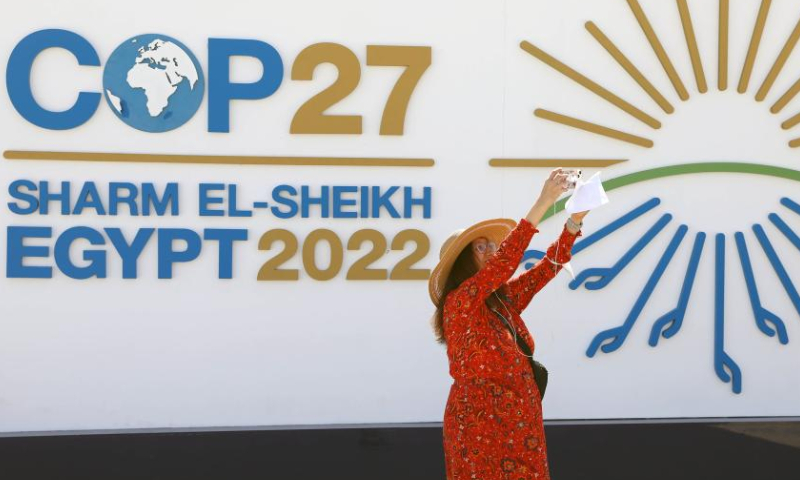COP27 nears end with parties calling for developed countries to fulfill their finance pledge

A woman takes pictures in front of a display board of the 27th Conference of the Parties of the United Nations Framework Convention on Climate Change (COP27) in Sharm El-Sheikh, Egypt, Nov. 6, 2022. Photo: Xinhua
As COP27 is drawing to a close, various parties called on developed countries to fulfill their pledge of providing $100 billion per year for developing countries to tackle climate damage, however, some Western countries are using COP27 to pressure China and other emerging economies to pay for the climate damage fund, which Chinese observers said was a typical blame game played by the West with the political intention of slowing down China's development.
The UN climate talks are scheduled to end on Friday, but according to AFP, COP27 has been extended to Saturday.
On Friday, European Commission vice-president Frans Timmermans launched a proposal on behalf of the EU that would see it agree to establishing a loss and damage fund, Guardian reported, calling it a "breakthrough" move.
In response, Mao Ning, spokesperson for Chinese Foreign Ministry, said at Friday's media briefing that developed countries need to take credible steps to fully fulfill their obligations of supporting developing countries in finance, technology and capacity-building. China hopes that COP27 will be a meeting that focuses on implementation. It is expected to fully and faithfully implement the principles and goals of the United Nations Framework Convention on Climate Change (UNFCCC) and the Paris Agreement, advocate the translation of the goals of Nationally Determined Contributions into concrete actions, make substantive progress in adaptation and finance, which are among the biggest concerns of developing countries, and advance the building of a global climate governance system that is equitable, reasonable and win-win, Mao said.
Mao's remarks came after Thursday's appeal from the UN Secretary-General Antonio Guterres, who urged parties to rise to the urgency of the moment and agree on real solutions as countries remained divided on several significant issues including loss and damage, which was included in the official agenda for the first time in the history of UN climate conferences.
"There is clearly a breakdown in trust between North and South, and between developed and emerging economies. This is no time for finger-pointing. The blame game is a recipe for mutually assured destruction," Guterres said, according to the UN.
The UN chief also asked the developed countries to fulfill their pledge of providing $100 billion per year for developing countries and set a credible roadmap for doubling adaptation finance.
Also on Thursday, a draft of the final decision was published by the COP27 Presidency, with the text referencing the doubling of adaptation finance and welcoming the agenda item on loss and damage, but it doesn't call for the establishment of a new financial facility, according to the UN.
China supports the demand of developing countries to appeal for loss and damage funds from rich countries with regard to the impact of climate change, but some Western media have apparently beefed up their hype that China should pay for the fund as the COP27 reaches its end.
The Guardian report said the EU's decision "places much greater pressure" on China to provide climate finance.
Li Shuo, a senior global policy adviser at Greenpeace China who is attending the COP27 in Egypt, told the Global Times on Friday that establishing a fund mechanism for the loss and damage issue is of great importance for the COP27.
Developed countries, as the most important contributors of greenhouse gases in history, should take a leading role in paying for this loss and damage fund. Asking developing countries to contribute when developed countries have not made their contributions is inappropriate, Li said.
He said it will hurt the mutual trust between developed and developing countries and may also hinder the actual implementation of the funding mechanism.
According to a statement sent by Greenpeace International to the Global Times, it is the richest, historically most polluting countries that have been blocking progress at COP27 on establishing the loss and damage finance facility.
"The EU appears to be starting to listen to some of the demands from developing countries, while the US, New Zealand, Norway and COP31 host hopefuls Australia, among others, are the most visible blockers," the statement said.
Li Haidong, a professor at the Institute of International Relations at the China Foreign Affairs University, told the Global Times that pressuring China to pay for the loss and damage fund is a typical way for the West to shift blame to China, when they are the largest greenhouse gas emitters in history.
"This kind of move from the US and Europe violates the principle of fairness and justice that must be reflected in the climate change response, and they are attempting to get China to contribute more than expected on the climate issue to serve their political intention of slowing down China's growth," Li said, noting that the West has enhanced these moves along with China's rapid development.
Responding to a question on whether China should also pay funds for the loss and damage issue, China's special envoy for climate change Xie Zhenhua said at a press conference during COP27, "So far, no one [from the US] has raised this issue with me, and it seems that they are too embarrassed to raise this issue with me."
Xie said the solution to the loss and damage issue is clear, that is, the principle of "common but differentiated responsibilities" established by the UNFCCC, the Paris Agreement, and the Kyoto Protocol, which are all based on scientific research and historical responsibilities.
"China is willing to, though not obliged to, help developing countries enhance their adaptability through South-South cooperation," Xie said, adding that China has provided 2 billion yuan ($275.8 million) to developing countries for adaptation and mitigation.



